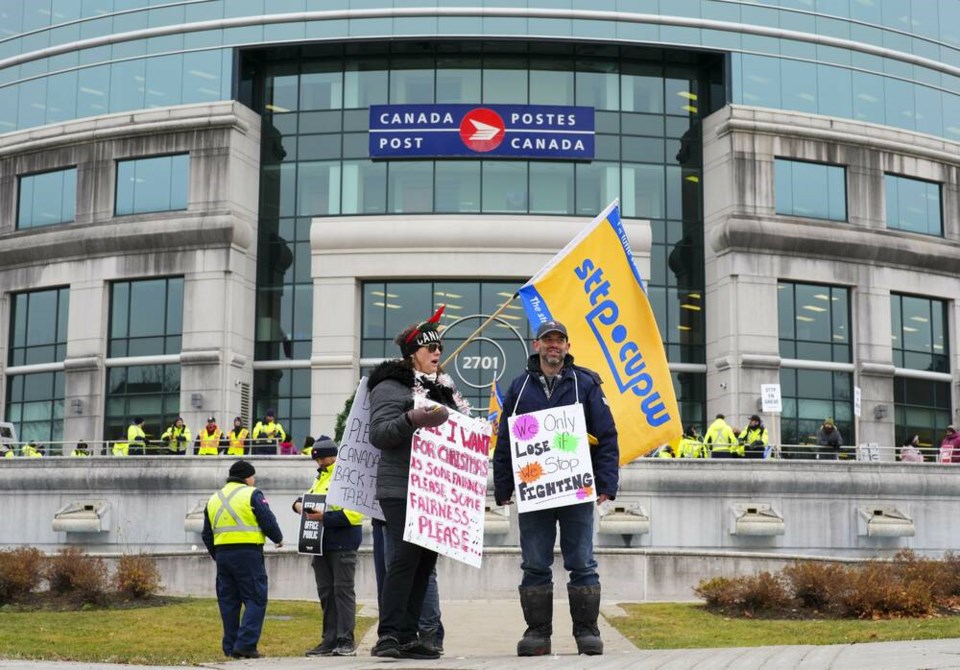A commentary by a Canadian business leader who lives in Victoria.
One annoying characteristic of Canadian unions is timing strikes to when they will cause the most harm and stress.
As the busy holiday season approached, Canada Post workers went on strike, leaving small businesses scrambling to make alternative arrangements. Not an easy task, as the cost of FedEx and UPS is prohibitive for many.
Purolator, which Canada Post owns, has lower rates, but Teamsters Canada has prohibited its members from handling packages identified as an alternative to Canada Post.
As a result, according to Corrine Pohlmann of the Canadian Federation of Independent Business, “People unsure about delivery timelines are staying away from shopping altogether. It’s just the next big obstacle our members must deal with.”
Service Canada had to hold off mailing 85,000 passports, forcing many Canadians to cancel travel they’d already paid for. On-time delivery of pension and financial assistance cheques is also hit.
Canadians have had to endure a series of work stoppages in 2024. In August, after nine months of negotiation failed to produce an agreement, the country’s two largest railways locked out unionized workers, disrupting a railway system that moves $1 billion worth of goods per day.
The federal government issued a back-to-work order a week later.
Port strikes are even more damaging in dollar terms. Last month, Port of Vancouver officials locked out union workers after they rejected a 19.2 per cent increase over four years.
That disrupted $800 million a day in shipments. A week later, Port of Montreal dock workers walked out, disrupting another $400 million a day and bringing the total port shutdown toll to $1.2 billion a day. After another few days, Ottawa issued a second back-to-work order.
Measuring the impact of dock and rail strikes in terms of reduced shipments vastly underestimates losses to businesses that count on shipped goods to replenish their inventories and keep their businesses afloat. Transportation shutdowns disrupt the entire supply chain for both manufacturers and retailers, and hit the whole economy.
According to Statistics Canada, last year saw a huge increase in person-days not worked due to work stoppages — from 1.9 million in 2022 to 6.6 million in 2023.
Data for 2024 aren’t yet complete but might well end up being even higher. The negative impacts reverberate through an economy that’s already seriously underperforming our largest trading partner.
Only 10 per cent of American workers are unionized, compared to 30 per cent in Canada — which is yet another reason why Canada’s per capita productivity, a key indicator of living standards, is 30 per cent lower than in the U.S.
Are unions in Canada creating two classes of workers, haves and have-nots? The website of the United Food and Commercial Workers Union (UFCW), Canada’s largest private-sector union, says: “Union workers make an average $190 more per week and are more likely to have jobs that provide health insurance, paid vacation, holidays and sick leave, scheduling overtime protection and other benefits and have more rights that protect them on the job than non-union workers.”
This all sounds great, provided the nature of the work fits into a union model and employers can afford it. It’s no surprise that the unions causing havoc are employed by huge private-sector monopolies like railways and ports.
Then there’s Canada Post, a government-owned monopoly that’s particularly important to ordinary Canadians and small businesses. Virtually all non-union businesses and their customers — the have-nots — are the victims.
The reality is that Canada’s unionized monopolies are both dividing and destroying our country. Our elected representatives need to extend the list of essential services where striking is prohibited to include health-care workers, police, firefighters and electricity-supply workers.
Unfortunately, our legislators have made union domination even worse. In June, the Trudeau government passed legislation banning replacement workers in federally regulated workplaces such as Crown corporations, railways and television broadcasters.
It was predictable that the Liberals and NDP would support the ban but, surprisingly, the Conservatives also voted for it.
As Matthew Lau wrote in the Financial Post, “The legislation shows only that politicians value certain privileged unionized workers. They do not value other members of the labour force who are more disadvantaged, less privileged and have less political power.”
I guess the only action left for beleaguered “have-nots” is to wage a personal protest campaign expressing our outrage to those who are supposed to be representing our interests. But best send our petition by email, not struck mail.
>>> To comment on this article, write a letter to the editor: [email protected]



